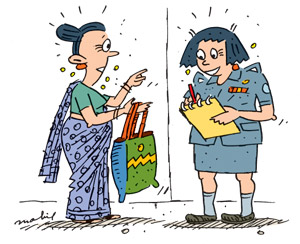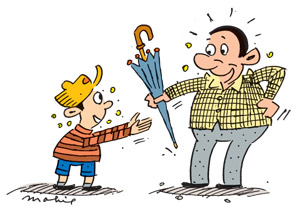|
 by
R. S. Karunaratne by
R. S. Karunaratne
Know how and where to
use ‘put’
The simple word ‘put’ is an irregular
verb meaning ‘to move or place something or someone in a position.
1. ‘Put’ is used to talk about moving
or placing things or people.
She put the bunch of keys under the pillow.
He warned me not to put my feet on the seat.
If you have a mobile phone, put it here.
Where can I put this bag?
|

Where can I put this bag? |
Put everything into this box.
2. ‘Put’ is sometimes used to talk
about non physical things
I put a lot of effort to learn psychology.
Can you put all your theories into practice?
The management is putting pressure on the trade unions.
Father’s sudden death put an end to his education.
3. ‘Put’ is used to talk about moving
physical objects.
Mother asked me to put my clothes away.
I had to put up a wall around the house.
He put his shirt on and walked away.
‘Put that book down,’ ordered the teacher.
Put this umbrella in a safe place.
4. There are many combinations with
‘put’.
Don’t put pressure on him to do it.
Your weight will put a lot of strain on the heart.
You have put me in an awkward situation.
You should have put your point of view at the meeting.
He wanted me to put my suggestion in writing.
Some rules are good but you can’t put them into practice.
The management is trying to put him out of work.
Exam failure has put me into a lousy mood.
Let me put you straight. I didn’t use your laptop.
|

Put this umbrella in a safe place. |
5. ‘Put’ is used in many phrasal
verbs.
Who put the rumour around that I am leaving?
You put your ideas across very well.
I used to put aside some money every month.
The price of the computer has been put at Rs. 50,000.
No toy guns here, put them away.
You have failed to put the book back in the shelf.
I don’t wish to put my work before my family.
I am trying to put all my painful memories behind.
We are putting you down for the foreign trip.
Many suggestions have been put forward to improve the country.
Avoid these
cliches
The word ‘cliche’ was originally French.
In English this borrowed word means an expressive and memorable form
of words that could be employed ready made, thus avoiding having to
think up something original for every occasion.
Pay attention to the following
cliches and try to avoid them in your speech and writing.
1. Achilles’ heel comes
from Achilles, a hero in ancient Greek mythology. It means a fatal flaw
or weak spot.
2. Acid test means
searching analysis or proof.
3. Actions speak louder than words.
In plain English it means ‘It’s what you do that counts, not what you
say.’
4. Add insult to injury.
It means ‘make matters worse.’
5. Address the issue is
found in business and official letters. Say, ‘take action.’
6. After due consideration
is found in official communications. Say, ‘After thinking about it.’
7. Against one’s better judgement.
Say, “Reluctantly’ or ‘with reluctance.’
8. Aided and abetted is
legal jargon. You can say, ‘helped’ or ‘supported.’
9. Alive and kicking is
mostly found in journalistic writing.
Use ‘active’ instead.
10. All and sundry is a
popular cliche. Say ‘everyone.’ |

